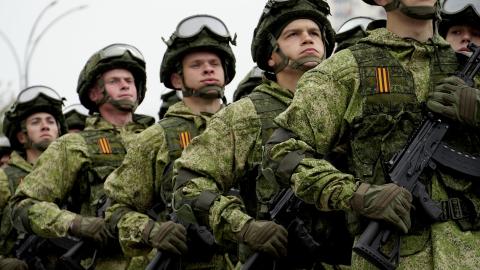The European Commission, the executive branch of the EU, has recommended that accession talks for EU membership should start for Ukraine and Moldova, and that Georgia should receive its long awaited EU candidate status. The European Council is expected to vote to approve this next month, the beginning of what will be a long but important process.
All three states bring an added complication to EU enlargement: the presence of Russian troops on their territory.
Russia’s illegal military presence in Ukraine began in 2014. In November 2013, Ukrainian President Viktor Yanukovych, under pressure from the Kremlin, failed to sign an association agreement and free trade deal with the EU despite promising to do so. Instead, he agreed to join the Russia- led Eurasian Economic Union. The Ukrainian people felt betrayed and took to the streets. Months of street demonstrations led to his removal in early 2014.
Russia responded by sending in unmarked troops to occupy Ukraine’s Crimean peninsula under the pretext of “protecting the Russian people.” This was followed by military meddling in eastern Ukraine. After eight years of low intensity conflict, Russia carried out the large-scale invasion of Ukraine in February 2022. Last summer, the EU offered candidacy status to Ukraine. This month, accession talks started — exactly a decade after Yanukovych reneged on his promise.
Russia’s military presence in Moldova is a legacy of the Soviet Union. When the USSR was disintegrating, Moldova, at the time part of the Soviet Union, declared independence. At the same time, the region of Transnistria, which is considered by the international community to be a part of Moldova, tried declaring independence. A war broke out between Moldova and the separatists in the early 1990s, with Russia backing the latter. In 1999, Russia agreed to remove all its troops and weaponry from Moldova by the end of 2002 but never followed through. Today, 2,000 Russian troops are still based in the breakaway region.
Since the 1990s, Moldova has swayed between pro-Russian and pro-European governments. However, in recent years, elections have returned decisively pro-European governments to office. Russia’s invasion of Ukraine in 2022 was a wakeup call for Moldova, and the government has since pursued closer relations with Europe. Moldova was finally granted EU candidate status last year and will soon begin accession talks with Brussels.
After its Rose Revolution 20 years ago this month, Georgia has pursued a policy of EU and NATO memberships. In 2008, after NATO declared that Georgia would join the alliance at some point without committing to a firm timeline, Russia sensed indecision and invaded. After a brutal five-day war in August 2008, Russia continues to occupy about 20 percent of Georgia’s territory.
Since the reemergence of nation states in Eastern Europe after the fall of the Soviet Union, the enlargement process for the EU has become a topic of debate across Europe. Some believe the EU enlarged too quickly in the years after the Cold War, and without the proper institutional reforms needed to accommodate so many new members.
For example, some policy issues, such as those relating to foreign affairs, defense, and economic sanctions require unanimity among members before a decision can be made. This means that just one country out of the 27 can block major initiatives in foreign and defense policy. Some EU members have called on this to be changed before new members are brought into the union.
In part, this is why the enlargement process has stalled and a new member has not been added since Croatia joined in 2013. This is the longest period without new members since the first round of enlargement in 1973.
There is also a major challenge related to security that is not discussed when it comes to Ukraine, Moldova or Georgia joining the EU. One of the main reasons they have not joined NATO is that each country has Russian troops occupying part of their territory. Because of NATO’s Article 5 mutual defense clause, which states that an attack on one is an attack on all, there is a concern that a country joining NATO, while in a state of war or “frozen conflict” with Russia would automatically drag the alliance into a war. The EU also has a mutual defense clause in Article 42.7 of the Treaty of the European Union. The same concerns about NATO’s Article 5 apply to that. So far there has been no discussion on how to resolve this issue.
Russia has developed and perfected a formula to keep its neighbors out of the EU and NATO: invasion and partial occupation. Russia’s actions toward Ukraine, Moldova, and Georgia in recent years is a great example of this. Without any creative or bold solution, it is unlikely that any of the three will join the EU while Russian troops remain on their territory. Of course, Russia knows this.
In the case of Ukraine, the fastest and most direct way to get into the EU (and NATO) will be a military victory expelling the Russian invaders. The US and Europe should be arming Ukraine with this goal in mind. If this happens, it is likely Russia would have little choice but to leave Moldova and Georgia too. This would also pave the way for their EU (and NATO) membership.
This decision by the European Commission comes at a crucial time in European security. While it will bring these three countries closer to EU membership, it will probably be a long process. Russia will not allow it be easy.















